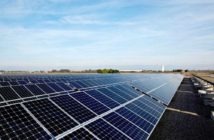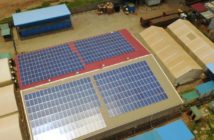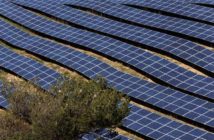Solar Novus Today
WRITTEN BY ANDREAS BREYER
POSTED IN EDITORS BLOGS
 In addition to developing the long-term “Desert Power 2050” plan, which was presented on Thursday, Dii together with local partners and stakeholders follows the strategy of setting up reference projects. The initial capacity of 500MW in Morocco – half of these have already been specified with 150MW solar thermal energy and 100MW wind and PV – has been extended to a total volume of 2.5GW and now also includes projects in Algeria and Tunisia with a planned capacity of 1GW per country. Solar Novus Today (SNT) Senior Editor, Andreas Breyer, talked to Dr. Aglaia Wieland, DiiManaging Director about these projects.
In addition to developing the long-term “Desert Power 2050” plan, which was presented on Thursday, Dii together with local partners and stakeholders follows the strategy of setting up reference projects. The initial capacity of 500MW in Morocco – half of these have already been specified with 150MW solar thermal energy and 100MW wind and PV – has been extended to a total volume of 2.5GW and now also includes projects in Algeria and Tunisia with a planned capacity of 1GW per country. Solar Novus Today (SNT) Senior Editor, Andreas Breyer, talked to Dr. Aglaia Wieland, DiiManaging Director about these projects.
SNT: Dr. Wieland, the plans for reference projects in the MENA region now have arrived at GW level and include three countries. What can you tell us about the status of the plans in Algeria and Tunisia?
In Algeria, together with local stakeholders we will jointly evaluate in the coming months how the targeted 1GW of renewables can be realized. The commitment is there in Algeria to realize this 1GW in renewables, out of these approximately 900MW for export and 100MW for domestic consumption. The timeframe very much depends on the technologies that are chosen, and at the moment the project still is completely open to all technologies including wind and the various solar technologies. What I feel important to point out is not to see the projects isolated: In Morocco solar plans already exist, as well as the transmission network infrastructure. In Tunisia and Algeria part of the project is to evaluate the possibilities of an interconnector to Europe. In Tunisia and Algeria the picture still is a different one. But only if all three geographic areas can make progress can we validate the vision and prove that it really works.
Is the very high export share as it is planned by Algeria a mandatory requirement for financing the projects?
Export of renewable energy in the start-up period certainly makes financing easier. However, one has to take a close look at the market conditions in the respective country. Algeria has always been rich in natural resources and thus self-sustaining and exporting fossil fuels. Morocco, on the other side, has always importer of fossil fuels. Here you see the different motivation: Morocco primarily wants to become independent from imports and Algeria seeks to diversify its energy supply and eventually also be able to export renewables on a larger scale.
How do the concrete planning periods look in these countries, also with respect to financing and the capital contribution coming from these countries?
At the moment we are not yet in the implementation process in Algeria, but we see a strong readiness to commonly think about how to implement the one GW there. This also implies the readiness to invest. Financially, due to its fossil resources, Algeria certainly has the best prerequisites to stem investments on its own. However, I’d like to point out that Dii follows a Win-Win situation for all players involved, thus all projects in all countries will only be realized with the respective country as a true partner.
What can you report about third country, Tunisia, where Dii plans to enable reference projects?
In Tunisia, Dii as well as in the other regions acts as a market enabler and in summer 2011 has begun to develop a country strategy together with local players. This strategy is currently being finalised with the partners in Tunisia and then goes into the next phase of very specifically package the planned one GW of wind, PV and CSP power into concrete projects. For each of those projects, a business case will be developed and implemented, either from Dii shareholders/associated partners, or from other market players. Our goal now for 2012 is to prepare in these three countries 2.5GW of renewables on a conceptual basis; this is quite a number. By this, and this is the important message, we are moving in the right direction. And in this framework we can start common projects and as well start to think about the regulatory environment on a European level and maybe beyond that also in North Africa, since the relevant institutions in the respective countries have to be evaluated and included in the process.
Dr. Wieland, thank you for the interview.
Interviewed by Andreas Breyer, Senior Editor, Germany, Solar Novus Today.
Related Stories
.






